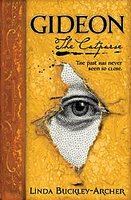
Just yesterday Roger Sutton got a conversation started about trilogies and whether or not books in trilogies should be able to stand alone. I got all snotty and said, "Am I being too harsh to suggest that a book that can't stand alone is a marketing tool?"
I truly do believe that all books should be able to stand alone. They are supposed to be a world that we enter and are part of. The world is supposed to be complete. A series is fine. But when books don't end, you're not talking a series anymore, you're talking a serial. That's not fine.
And then today I finished reading Gideon the Cutpurse by Linda Buckley-Archer. I wasn't aware it was the first book in a trilogy, so I never saw the end coming. Which is just as well because the end sort of isn't there. But that's okay.
This time. For this book.
Gideon the Cutpurse could be described as a genre bender. It's part sci-fi time travel, part English mystery (complete with a Scotland Yard detective), and part historical novel. It plays with conventions of each of those genres. In fact, you could sort of say that each part is just a conventional genre story. But then they get all mixed up together and the total is greater than the sum of its parts. (Or is the sum greater than the total of its parts?)
When I was a teenager, I loved historical fiction. My reading of historical fiction was no doubt what led me to minor in the subject in college. I don't read that much of it, anymore. About ten years ago I tried reading some historical fiction for kids and found it mind numbing. I don't recall being able to finish a single book.
The historical element in Gideon the Cutpurse is just incredible. Maybe you have to be into history to get it, but when the promotional people for the book say, "The past has never been so close," they're not just blowing smoke. A lot of stock characters appear, but relating to twenty-first century children seems to give them new life. Gideon is a proper historical novel hero, answering only to God and his conscience, as he himself says. The bad guys are right out of central casting for historical novels, but they have depth. You feel for them. And there is a wonderful parson who is totally unparsonlike, drinking and gambling and mouthing off. In other books he would be a buffoon. Here he is redeemed by his caring for the children who have been entrusted to him by his cousin. The man actually gives the shirt off his back to another character.
And there's a highwayman! And a decadent aristocrat!
My only objection as I was reading the book was that I kept wishing I could see more of Gideon. And now it looks as if I will.
No comments:
Post a Comment